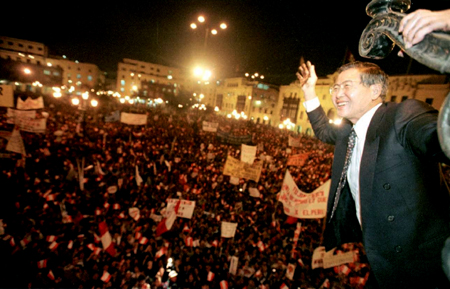

Reviews of Recent Independent, Foreign, & Documentary Films in Theaters and DVD/Home Video
Directed & Produced by: Ellen Perry. Written by: Zack Anderson & Kim Roberts. Director of Photography: Ellen Perry, Junji Aoki & Mel Henry. Edited by: Kim Roberts. Music by: Mark Adler. Language: English & Spanish with English subtitles. Country of Origin: USA. 83 min. Not Rated.
This documentary on Alberto
Fujimori and his Peruvian presidency is, supposedly,
an attempt to portray a man who used the atrocities
committed by the terrorist group, Shining Path, as
an excuse to create panic and seize complete control
of every governmental sphere. And yet, the film
offers a curiously benign portrait of a man whose
crimes and wrongdoings are still felt throughout the
country today.
Perhaps one reason is the rare access given
to the production team. The film begins and ends with Fujimori, offering his version of
his rise to power and his hopes for a
future favorable to his own interests. It intertwines
this with a summary of his
presidency, in chronological order, from his
surprising first election to the scandals that let to his downfall.
In his question-and answer-sessions, Fujimori is asked about
the crimes he is accused of. He either denies
them or justifies himself Ė he was
defending democracy, doing his duty, etc. The various discrepancies in his answers
are not questioned by the interviewer, thinking, perhaps,
that the former presidentís lies speak for themselves. One clear
example is when he is asked how he could have run for a second
reelection if the constitution forbade it. He
smiles ironically, as if admitting his own answer
is a stretch.
Others, each briefly, contradict his statements, such as Enrique
Zileri, editor of one of the few magazines that dared
to oppose Fujimoriís government, as well as a former American ambassador to Peru, a human rights advocate, and
Fujimoriís former wife, whom he kept almost incarcerated in
the presidential palace after she spoke publicly against
government corruption.
Although his 1995 campaign and the
1996 hostage situation at the Japanese
Embassy are given a lot of screen time,
the death squads, the repression of all
opponents,
and the power the military had over the government are passed over quickly. There is little analysis. And though a
narrator mentions corruption, and the
fact Fujimori settled in Japan,
where he faxed his resignation (leaving his daughter, Keiko,
alone in Peru to face the music), he is shown
signing copies of his book and being praised by
Japanese right wingers. Perhaps the film intended
to be subtle; but I find too much subtleness, when
referring to the horrific state of affairs from which Peru is
still recovering, a bit lazy. Fujimori gets the first
word, the last word, and in between, his word does not
seem to be much questioned at all. Roxana M. Ramirez, lawyer and journalist, formerly a member of the Peruvian Human Rights and Public Service Ombudsman
|